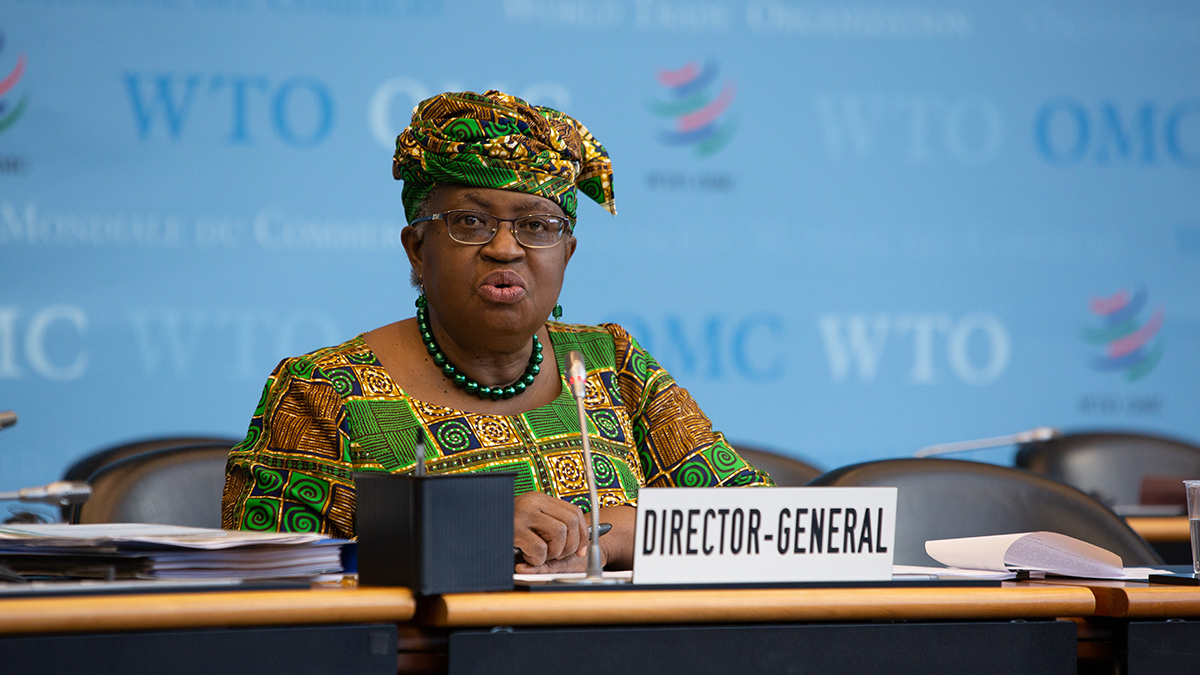WTO considers Nigeria as vaccine production hub
World Trade Organisation (WTO) said Africa is working with the European Union and other partners to help create regional vaccine manufacturing hubs with Nigeria, South Africa, Senegal and Rwanda. Ngozi Okonjo-Iweala Director-General WTO said on Monday during a virtual meeting, “We have now seen that over-centralization of vaccine production capacity is incompatible with equitable access […]

World Trade Organisation (WTO) said Africa is working with the European Union and other partners to help create regional vaccine manufacturing hubs with Nigeria, South Africa, Senegal and Rwanda.
Ngozi Okonjo-Iweala Director-General WTO said on Monday during a virtual meeting, “We have now seen that over-centralization of vaccine production capacity is incompatible with equitable access in a crisis situation.’’
- Bandits release pictures of abducted Kebbi teachers, students
- UAE makes U-turn, reinstates ban on Nigerian flights
“Regional production hubs, in tandem with open supply chains, offer a more promising path to preparedness for future health crisis.’’
Meanwhile, the Coalition for Dialogue on Africa (CoDA), in partnership with the Igbinedion University , Okada, has launched a task team for the manufacture of vaccines in the continent.
CoDA is an independent international initiative of the African Union, African Development Bank (AfDB), African Export-Import Bank (Afreximbank), and the United Nations Economic Commission for Africa (UNECA).
Speaking during the launch of the task team in Okada, Edo state, on Monday, Chief Olusegun Obasanjo, Former President of Nigeria and Chair of the Board of Directors, CoDA,
said the initiative has the potential to positively change the vaccine and vaccination landscape across the continent .
“If we carefully nurture the initiative through to maturity, we would have laid a good foundation for a healthier Africa using, largely, resources from within the continent.
“Through initiatives like this one, Africa will be able to encourage and retain its talents and support them in finding solutions to its age-long healthcare challenges,” he said.
Represented by Abdoulaye Bathily, Co-Founder and Board Member of CoDA, he said Africa’s main challenge is not the lack of funds or resources, but inability to harness available resources to provide customized home-grown solutions needed to address the challenges across the continent.
Dr Monique Nsanzabaganwa, Deputy Chairperson, African Union Commission said “It is essential for the African private sector to be involved in public health research that will help find solutions to the health problems on the continent, particularly the limited access to vaccines and vaccination.
“Strengthening Africa’s health systems requires a convergence of the private sector, policymakers, the community, the civil society, and healthcare practitioners.
” I am very much delighted that Igbinedion University Okada is taking up the challenge to champion this new initiative that will help increase research, development, manufacturing, and distribution of vaccines in Africa.
“I am confident that the platform that will be created by the initiative will help bring relevant stakeholders together to dialogue, consult and come up with great ideas and actions that will raise public health profile in Africa to a whole new level,” she said
She said the task team which is also launched in partnership with the Pan-African Manufacturers Association, and other partners is a wake-up call to other private universities and businesses in Africa to contribute towards strengthening healthcare services across the continent.
Governor of Edo State, Godwin Obaseki, called for strengthened primary healthcare facilities in the continent , and increased efforts in addressing vaccine hesitancy.
Deputy Chancellor, Igbinedion University, and former Edo state governor, Lucky Igbinedion, said Africa could build on the current progress in vaccine research, development and manufacturing to solve the problems of infectious diseases on the continent.
He said the initiative is not meant to duplicate what is already being done by the African Union, Africa CDC, the World Health Organization, and other partners across the continent, but will complement all other efforts to ensure that Africa becomes self-sufficient in vaccine development and production.
Dr Osagie Ehanire, Minister of Health, said the COVID-19 pandemic appears to be receding in wealthier nations with easy access to COVID-19 vaccines; but vaccine coverage in African countries has been off to a slow start, due to inequitable distribution and fiscal constraints.
He said the supply is outstripped by global demand, especially in low income countries, “Africa being worst hit with barely 2% of the population vaccinated, compared with 30% to 60% in developed countries,” he said.
Dr Ehanire said the coming together of African countries to push, as one, for vaccine availability for the entire continent is an excellent approach, which Nigeria subscribes to under the African Vaccine Acquisition Task Team (AVATT) and registered to access vaccines for 50% of the population.
